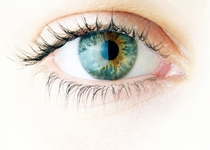 Patients with Graves’ disease, an autoimmune disorder that typically affects the thyroid gland, may also experience Graves’ eye disease, or Graves’ ophthalmopathy as it’s also known, which causes bulging eyes and the doubling of vision due to the disease attacking the muscles surrounding the eyes. This condition is present in about half of all Graves’ disease patients.
Patients with Graves’ disease, an autoimmune disorder that typically affects the thyroid gland, may also experience Graves’ eye disease, or Graves’ ophthalmopathy as it’s also known, which causes bulging eyes and the doubling of vision due to the disease attacking the muscles surrounding the eyes. This condition is present in about half of all Graves’ disease patients.
The disease affects two percent of women, typically appearing after childbirth. Genetics can also play a role in developing Graves’ disease. Genetics can account for up to 80% of the risk of developing Graves’. Exposure to second-hand smoke can also lead to eye symptoms.
Traditionally, the treatment for Graves’ disease has been surgery, but new findings from Loyola University have revealed that adopting a gluten-free diet with plenty of vegetables may just alleviate the symptoms of Graves’ eye disease and allow someone with the illness to see clearly again. Several patients have reported that adopting the diet has eased their symptoms, almost completely eliminating eye bulging.
The other advantage of adopting the diet is that it can help with weight loss. The patients who have adopted this diet also take nutraceutical supplements. Prior to this, surgery for both bulging eyes and double vision were the typical treatment for the disease. It’s thought that the balance that improved body chemistry provides can alleviate the symptoms of Graves’ disease.
But while a gluten-free diet appears to help, if you suffer from Graves’ disease, there are a number of other steps you can take to improve your symptoms:
Exercise: Since Graves’ disease affects the thyroid, patients may gain weight. Regular exercise can help to maintain a healthy weight. Graves’ patients may also develop brittle bones; weight-bearing exercises can help them to maintain strong, healthy bones.
Relax: Stress can aggravate the symptoms of Graves’ disease. Finding a way to relieve stress, be it going for a walk, having a hot bath, or listening to music, is an excellent way to avoid having symptoms grow worse.
Cool Compresses: If you’re suffering from Graves’ ophthalmopathy, applying cool compresses to your eyes is one way to lubricate your eyes while also providing soothing relief.
Wear Sunglasses: Because Graves’ eye disease causes bulging, your eyes are especially vulnerable to the sun’s ultraviolet (UV) rays. Wraparound sunglasses help limit your eyes’ exposure to UV light while also providing protection against irritation from the wind.
Elevate Your Head: Keeping your head elevated lessens the accumulation of fluid in the head and will relieve the pressure on your eyes.
Combine these natural treatments with a gluten-free diet and you could soon enjoy relief from the symptoms of Graves’ disease—and you could avoid costly surgery.
Sources for Today’s Article:
“Alternative to surgery for Graves’ eye disease: Low-carb, gluten-free diet may help,” ScienceDaily web site, July 9, 2014; http://www.sciencedaily.com/releases/2014/07/140709151533.htm.
“Diseases and Conditions – Graves’ Disease: Lifestyle and Home Remedies,” Mayo Clinic web site, July 1, 2014; http://www.mayoclinic.org/diseases-conditions/graves-disease/basics/lifestyle-home-remedies/con-20025811.
